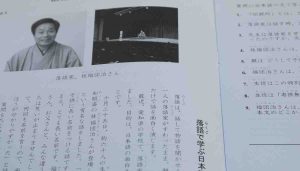A2 – Advanced Japanese
Who can be a candidate?
Obviously, candidates who will find this easiest are people who have passed the GCSE and/or the AS level.
Those who have passed Japanese Foundation Grade 2 exam should also not find it too hard.

When does the exam take place?
Late May/early June.
How much should candidates study before the exam?
An able student who has passed the AS should study at least four hours a week for a year; anyone with the GCSE should study for a similar number of hours over two years and if you are a complete beginner it will probably take three to four years of hard study.
Is it difficult to pass?
Yes.
Candidates have to be motivated and enthusiastic about studying, especially kanji (Chinese characters).
What skills does the exam test?
The ability to:
- understand a Japanese newspaper article (about 430 letters)
- translate a newspaper article in English into Japanese
- listen to a dialogue between friends/parents and children
- take notes
- write two good essays.
What do you have to know to pass this exam?
- 2000 kanji (hiragana and katakana are pre-requisite.)
- 6000 words
- Grammar for post-intermediate Japanese so that the candidate can express his/her opinion on current issues clearly.
Are there any listening/speaking papers?
No.
There is just one 3-hour-paper, ( Reading and Writing).
Are candidates allowed to use a dictionary?
No.
The use of any kind of dictionary is not allowed in the exam.
How is the exam organized?
Question 1 (20% of the marks)
You must read a Japanese newspaper article (440 letters or so) that is written for young people and answer around nine questions in Japanese.  The article embodies more kanji, more complex grammatical structures and is more interesting than the Adavanced Subsidiary paper.
The article embodies more kanji, more complex grammatical structures and is more interesting than the Adavanced Subsidiary paper.
In other words, it is more difficult to understand. The topics that were discussed for the past papers are as follows:
- Solar-powered bicycle (2003)
- HIV-positive patient (2005)
- Mounting rubbish on Mt Everest
Question 2 (20 % of the marks)
You are asked to translate an approximately 300-word-English essay into Japanese.
The structures that are employed in this English article are not as complex as those you find in quality British newspapers. The article could be one that was written by a young British student.
Quite often, the nature of the article in this question is broadly related to the topic in Question 1, so that candidates can benefit from both articles in terms of lexicon.
For example, in the 2005 paper, Question 1 is about HIV-positive patients and Question 2 writes about two boys, one boy from South Africa and the other from Japan, who express their opinions on this issue.
Section Two.(60% of the marks)
You need to write two 300-letter essays chosen from eight different topics.
Half of these topics are fact-based and the other half fictional such as short stories. Each topic has two options. Thus, in total, there are 16 different topics (2×8=16) to choose from.
These broadly defined topics have not changed recently, so candidates can practise writing essays based on the following.
Fact-based topics are as follows:
- Japanese cities (geographical)
- History on Meiji era
- Current society
- Japanese four seasons
Short stories are:
- one written by Kenji Miyazawa
- short stories written by Akutagawa
- short science fiction stories by Shinichi Hoshi
- short stories on a ghost written by Lafcadio Hearn (¬ò”ª‰_j
Topics 1 to 4 require students to know some facts about Japan.
For example, to write an essay about the seasons in Japan, one should know what Japanese people eat/drink/see/go to in each season.
For topics 5 to 8, candidates should read the stories well in advance, so that they are able to deal with various types of questions on each story.
Whichever topic is chosen, candidates are required to write two essays that are relevant to the questions. At the same time, an appropriate amount of kanji/nouns/grammatical structures has to be included. Regular and systematic practice on these topics will definitely make a huge difference on the exam day.
Strategies to pass:
Please bear in mind that a systematic approach to this exam will enable you to pass with a good grade despite the challenging nature of the exam.
- Increase your knowledge of Kanji up to 2000.
- Read easily written Japanese texts on various current topics.
- Enhance your awareness of Japan by reading articles written in English.
- Choose four topics for your two essays.
Two topics that you genuinely would like to write about and another two for back-up. Once you decide on these topics, keep writing practice essays. - Practise translating English articles into Japanese.
- You need a good teacher who can guide you on all these points.
- Visit Japan to expose yourself to its culture, so that you will be able to naturalize your language more easily.
- Never be complacent.

Learn all the tips for good essay writing – planning ahead, writing clearly, justify your statements, etc.
